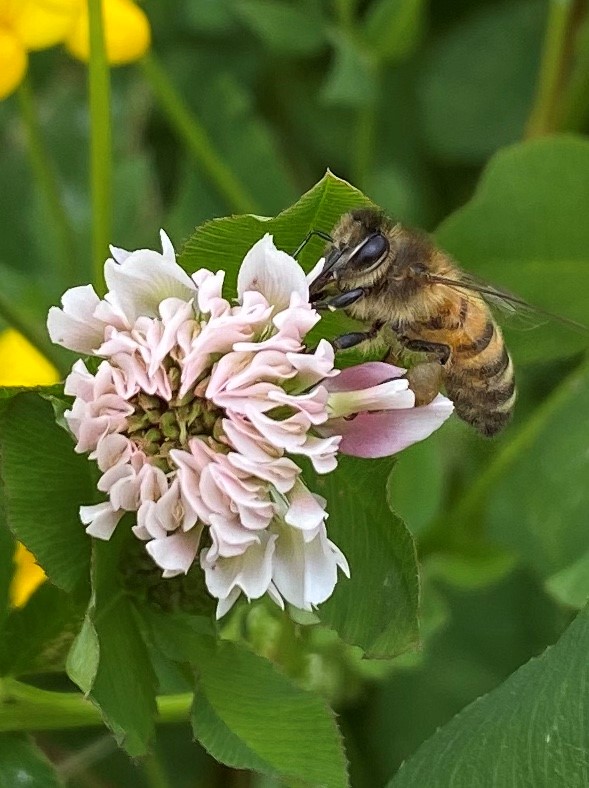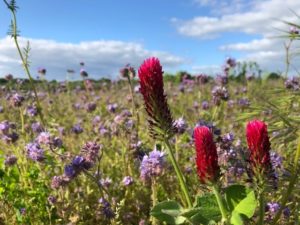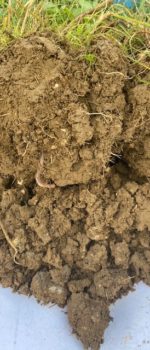Farm Manager, Nick Down manages the farming enterprise of the 3260 hectare Yattendon Estate just to the northeast of Newbury on a management agreement with Velcourt. The Estate in its present form is the amalgamation of several smaller estates acquired by the first Lord Iliffe between 1925 and 1940. Located in the North Wessex Downs Area of Outstanding Natural Beauty, the farming business has 2004 hectares of arable cropping and undertakes a further 118 ha of contract farming for a neighbour. The Estate also supports a small herd of British White cattle which graze the parkland at Yattendon. The soil types vary from Maxsted sandy loams in the south, Carstons clay loams with over 30% flint content and Andover & Upton series chalk loams to the north.

Arable cropping on the Estate has evolved over the last four years having moved away from growing oilseed rape after the 2018 harvest. Break crops are now made up of winter and spring linseed, winter and spring beans, spring oats and a small area of maize grown as forage. Both winter and spring wheat are grown for premium markets as milling and winter hybrid barley makes up the remainder of the cropping area. Straw is mostly chopped other than for the supply to two neighbouring livestock units, we also import organic matter in the form of cattle manure, biosolids and compost.
With the first changes to the basic payment scheme coming into effect this year, we have entered into a 5-year mid-tier countryside stewardship agreement starting in January 2021. The Estate had previously been operating a smaller entry-level scheme which came to an end in 2017. The new agreement will see us take approximately 340 hectares of the more marginal land out of production, allowing us to focus our cropping on the more productive land. The Estate has a number of smaller fields and awkward, sheltered areas that in most years don’t produce a return. This has allowed us to enter whole field parcels into arable options which will hopefully deliver quantifiable improvements over the 5 years without jeopardising our productivity and improving our efficiency.

After the removal of oilseed rape and adopting a wider crop rotation, the introduction of the stewardship agreement has also given us scope to reduce our overhead cost structure and re-consider how we establish our crops. We haven’t totally moved away from tillage but we are now evolving how we can reduce the intensity of our cultivations alongside taking opportunities to establish crops more efficiently and without a cultivation pass. We have learnt that with a wide range of soil types over a large area, the flexibility in our systems is more important than ever to cope with a changing climate while trying to reduce our reliance on synthetic inputs. We are still also fine-tuning our use of technology to make the best use of our inputs and take the opportunities to reduce them wherever possible. By carrying out an annual carbon audit on the farm, it’s clear to see how we can reduce the emissions from our business and the use of technology will be pivotal in achieving this.
We have greatly reduced the number of bare soil days across the Estate by increasing the area of cover crops ahead of spring crops. It is still difficult to put financial justifications against establishing a cover crop but for us, there is a significant benefit in preventing our soils from running together over the winter and mopping up nutrients leftover from the previous crop. A partnership with a neighbouring farmer has given us the opportunity to start to reintroduce stock back onto the farm by grazing some of the cover crops during the winter months. The health of our soils is vitally important, and we have a program of regular testing of not only the physical and chemical aspects but also the biological properties, which is giving us a much better understanding of how our soils react and perform. The more we study our soils, the more we realise there is still a lot more to learn, but this data helps to fine-tune our future soil management strategies.

We work closely with LEAF (Linking Environment and Farming) to ensure we have an integrated approach to our farm management and are producing food using the most sustainable approach.
We utilise the LEAF Sustainable Farming Review tool as way of benchmarking our actions and road mapping our future plans. We also want to use the LEAF Marque accreditation to demonstrate that we are delivering in these key areas such as the health of our soils and the protection of our landscape & biodiversity. Community engagement is an important part of our approach and we are proud to be able to demonstrate not only what we’ve achieved but also our future ambitions. LEAF Open Farm Sunday has been one of the ways we are doing this, but we also offer school visits and farm walks for various groups and organisations.
To coincide with the start of our stewardship agreement we have brought together a team of local volunteers who will help us to survey and monitor the effects we are having on the local environment. This data will allow us to improve the connectivity of the vital habitats across the Estate, through the careful management of these conservation areas, hedgerows, and field margins. We are also in the early stages of setting up a farmer-led cluster group with other local landowners and growers who boarder the upper stretch of the River Pang.